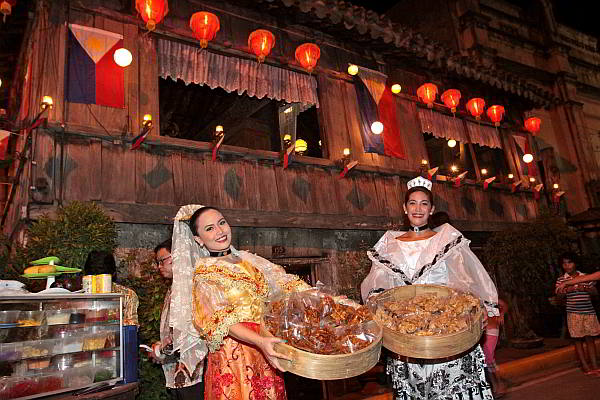
Delicacies from Carcar City like chicharon (pork crackling), and banana chips are displayed in front of the Yap-Sandiego ancestral house, in a one-night “Bisita sa Parian” event to promote tourism and the heritage value of Pari-an, Cebu City. (CDN PHOTO/JUNJIE MENDOZA)
In the streets of barangay Parian in downtown Cebu City, visitors relived part of Philippine history with the presence of horse-drawn carriages called tartanillas and dancers in Filipiniana attire entertaining them on Friday evening.
The event Bisita sa Parian (Visit to Parian) was part of the month-long Lakbay Lingaw celebration launched by the Cebu City Tourism Commission (CCTC) in September.
The phrase means “fun journeys” in Cebuano.
“We are holding Lakbay Lingaw in recognition of tourism as an engine of growth especially in Cebu and an economic driver at the same time,” CCTC chairperson Tetta Baad said.
Cebu City is known for its heritage and culture so no first-time visitor should miss a visit to the Basilica Minore del Sto. Niño and the Magellan’s Cross, where a wooden cross in a kiosk marks the 1521 discovery of the Philippine islands by the Portuguese explorer Ferdinand Magellan.
While these sites are popular among tourists, other areas like the Parian district, once the center of society and culture of old Cebu, is less known.
The place includes the Heritage Monument, a tableau of larger-than-life brass sculptures of historical events and figures and in Cebu.
The 1521 encounter of Ferdinand Magellan and his gift of the Sto. Niño image to Sugbo chieftain Humabon and his wife is reenacted at the Prian Heritage Monument in Cebu City. The evening Bisita sa Parian. (CDN Photo/ Junjie Mendoza)
Performances
Last Friday’s event invited visitors to freely stroll about from 6 p.m. to 11 p.m. with no vehicles in Mabini Street near the monument to disrupt the walkabout.
People could take a tartanilla ride at P25 per adult while children could ride free.
On Friday allowed tourists to walk the downtown area to the Yap-Sandiego ancestral home, ride a tartanilla (CDN PHOTO/ JUNJIE MENDOZA)
“Cebu has been known for its culture and heritage. What we’re trying to do now is to enhance this experience,” Baad said.
On the street, members of the Sandiego Dance Company performed in Filipiniana.
Live rondalla music was played by the Children’s Joy Foundation.
There were exhibitions of eskrima, a form of pre-Spanish Visayan martial arts stick fighting also known as arnis.
An open house was declared in two heritage houses-turned-museums — the Yap-Sandiego house, the oldest Chinese house in the Philippines, and the Jesuit House of 1730.
One of the rooms in the Jesuit House of 1730 on Zulueta Street shows a Spanish-era bedroom in what was once a mission house in the Pari-an district. The house-cum-museum was open to visitors during the Bisita sa Pari-an (Visit to Parian).
(CDN PHOTO/JUNJIE MENDOZA)
At the same time, mimes dressed as historical characters roamed the streets waiting to have “selfies” with curious visitors.
Among the living characters were Portuguese explorer Magellan with a Spanish friar, Spanish soldiers, Rajah Humabon and his Queen Hara Humamay.
The evening event may be prelude to other pedestrian-friendly heritage experiences in Cebu City.
Baad said the tourism commission is aiming to develop the Lakbay Lingaw program for the next four years.
Delicacies from Carcar City — pork chicharon and Carcar lechon — are displayed in front of the Yap-Sandiego ancestral home.